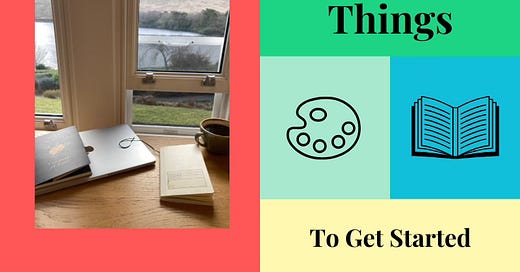The Writers' Co-op, B&N, network to get work
5 Freelance Things to help you get started on your own
For 5 Things this month, I’m doing things a bit differently. This week marks two years since I launched my freelance business. Quitting the stability of a full-time job can induce gut-wrenching dread, especially when you don’t know whether you can really do it on your own. The decision is one that I talked through for a long time with friends, family, my therapist beforehand, and even once I took the plunge, I kept feeling like who the fuck do I think I am. It’s also one of the best decisions I’ve made professionally and one of the things I get asked about the most from other writers who want to give it a try.
For some context, my freelance business is structured around four anchor clients—think corporate copyediting, ghost editing, and content marketing. I supplement that with writing for magazines, some of which is recurring and assigned to me, like with Décor Maine, and for others I’m going out and pitching editors.
Here are five things that helped me get started as a fulltime freelance writer.
5 Freelance Things
1. The Writers’ Co-op
This podcast easily gave me the biggest push to consider freelancing as something that I could achieve. I began listening to
one summer during the pandemic. I was in grad school and trying to find more opportunities in freelance journalism. This helped me get my first assignment for Atlas Obscura and start writing author Q&As. While I came to the podcast for insight on pitching, invoicing, and negotiating rates, I found that its insights on how to start thinking of your work as a business gave me what I needed to imagine the possibility of going on my own. Once I’d begun contemplating the career jump, I listened to the first season all over again and started to cultivate deeper connections with likely anchor clients. This made the jump much more manageable and also helped me understand some of the business mechanics, like taxes and health insurance options.2. Networking and referrals
The bulk of my work comes from referrals. I think this is a common refrain among freelancers, and it can feel like, “Sure, but how the hell do you get referrals?” For me, they’ve come from friends, former coworkers, editors I meet at conferences like AWP or on press trips when on travel assignments. I started freelancing before the world was up ChatGPT’s butt, so maybe I connected with clients who cared about human work and forged those connections early, but a lot of people still need help with writing and editing.
I’m currently doing the Artist’s Way with Elizabeth Kott, and the idea of synchronicities comes up a lot. When you put something out there confidently, the universe responds to you. I think about this in practical terms for freelancers—when you say you’re open to business and you’re putting out work that others can see and read, people notice and will keep you in mind. My college writing professor recently referred me a manuscript consultation client. I have a magazine I wanted to write for, and I knew one of my editors is a contributor. She made a connection when I asked. I also think about this all the time from the other end—how can I connect other people with freelancers in my network? I do think there’s a positive abundance mindset with freelancers, and embracing this has been valuable for me in my work.
3. But swinging big
While a lot of my work comes from network connections, I think it’s just as important to swing big. Pitch your dream magazines and editors first. Some of my biggest bylines—for Esquire, Vanity Fair, Dwell, NYLON—came from cold pitching editors. I think creative writers are familiar with this. It feels fraudulent to submit to The New Yorker or The Paris Review, and, too, there’s next to no chance they’ll publish you if you never send them anything. I do also think glossy magazines tend to have a lower barrier to entry—if you can write well and bring a good pitch, it’s not as impossible to break through.
4. LinkedIn
I hate networking, and I also hate social media, and I’ve realized that they’re all necessary to making new connections in the freelance world. So many writing opportunities used to come through Twitter. With that gone and Bluesky fairly unintelligible and annoying to me, I’ve found that LinkedIn is actually a smart starting point for connecting with editors. Editors frequently post calls to LinkedIn, freelancers share stories they’ve written, and interacting with others is both supportive of others’ work and can help a cold pitch become warmer when the time is right.
5. Barnes & Noble’s magazine section
This was a more recent discovery for me, but when Barnes and Noble opened in South Portland, my friend Meg told me how great the magazine section there is, and I went to check it out. I regularly make the trip to stock up on magazines that I want to write for. In an ideal world, I read one of these a week and try to write to someone when I like a story. This helps me stay current on the kinds of stories that are getting published now. Also, many print magazines will include email addresses, which can’t always be found on an online masthead.
What questions do you have about freelancing? What’s most unclear to you about how to make it work (e.g., getting anchor clients, writing pitches, do you need an LLC, taxes, health insurance)? What fears are preventing you from diving in?




